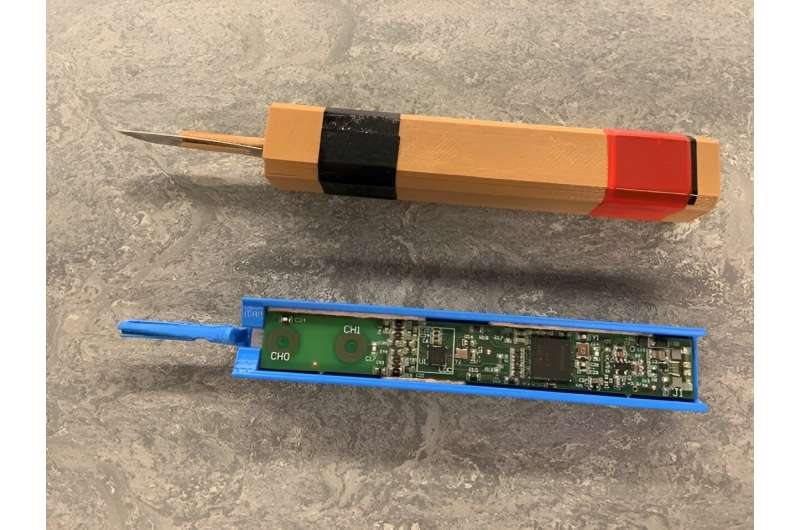This article has been reviewed according to Science X's editorial process and policies. Editors have highlighted the following attributes while ensuring the content's credibility:
fact-checked
trusted source
proofread
Smart scalpel could help doctors hone surgical skills

Scalpels with built-in sensors could streamline training for surgeons and pave the way for procedures performed by robotic devices, a study published in Communications Engineering suggests.
Researchers who studied data captured by the scalpel during trials report that its sensors could accurately track how much force users were applying during surgical procedures, and how they were controlling the device over time.
Sensor data analysis showed the technology could assess this key skill as effectively as traditional evaluation methods, which involve visual assessment by experienced practitioners.
Further development could see the technology—which is equipped with a newly developed force-sensing system—used to assess a wide range of surgical skills and aid the creation of robotic devices that can perform procedures safely and efficiently, the team says.
Sensor-loaded device
The low-cost device, developed by researchers in the School of Informatics, consists of a scalpel connected to a sensor-loaded circuit board fitted inside its handle. The research team designed a machine learning model that analyzes data captured as force is applied by scalpel users.
While the level of force applied is known to be important in surgery, there have been few tools until now capable of measuring it in real-life settings. These types of measurements have also never been used in traditional assessments of surgical skill, the team says.
Surgical procedure
Researchers tested the new technology by tracking 12 medical students and two surgeons as they carried out a procedure known as an elliptical incision.
The procedure—which involves making two curved cuts to the skin—is used to remove moles and skin legions such as melanoma. Tests were performed on synthetic material made of gelatin and silicone that mimics the properties of human skin.
Assessing skills
Data analysis of each participant's skills was compared with naked eye assessments made by four surgical experts—two neuroscientists and two plastic surgeons.
Results broadly matched surgical experts' assessment of each user's ability, suggesting this type of technology could help simplify the process of assessing surgical skills.
Some discrepancies arose, partly because neuroscientists and plastic surgeons have differing instrument and tissue handling techniques, the team says.
"We are excited to develop this new system, which uses a combination of real-life sensing technology and machine learning methods to quantitatively assess surgical skill. This system will enable the development of new systems for skill assessment and training, and could one day lead to the creation of automated surgical devices that can assist surgical teams," says Professor Ram Ramamoorthy.
More information: Artūras Straižys et al, A generative force model for surgical skill quantification using sensorised instruments, Communications Engineering (2023). DOI: 10.1038/s44172-023-00086-z



















